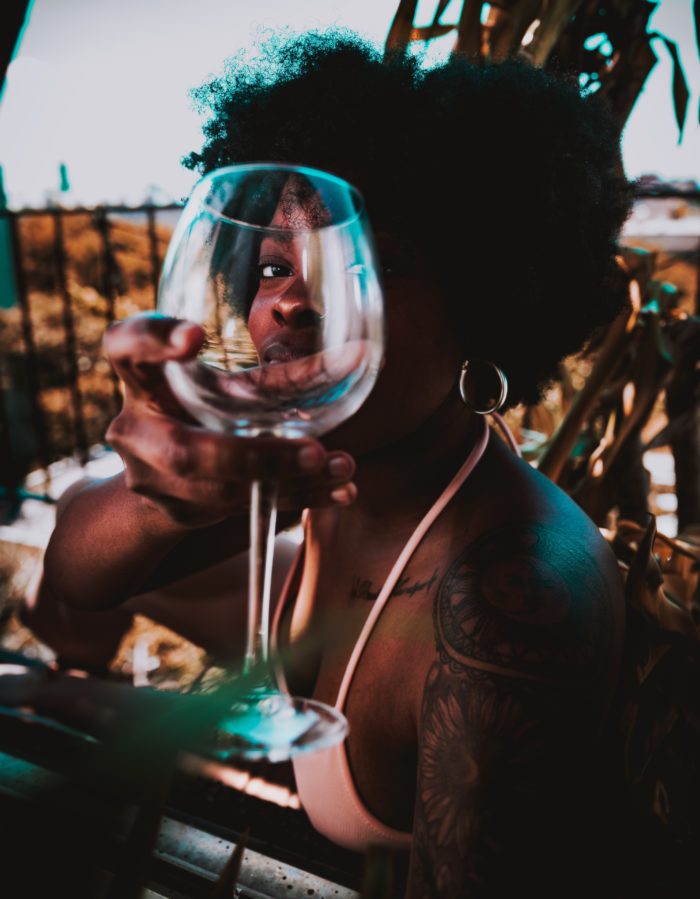
A few years ago, I quit drinking alcohol. Well, mostly. The reasons for quitting were plentiful, but one of those reasons was to help save my skin.
For years, my skin had struggled with a constant influx of acne breakouts. Wanting to provide as much healing support to my skin as possible, I decided to cut out alcohol. It seemed intuitive that alcohol was not good for skin health, right? I mean it’s technically a toxin after all…
As it turns out, research shows there is a connection between alcohol consumption and skin health. Unfortunately for those of us who enjoy drinking and having glowing skin, the below research might not be welcomed news.
Why you may want to quit drinking for skin health
Alcohol prevents nutrient absorption…
Studies have shown that alcohol prevents nutrients from being absorbed and metabolized by the body. Alcohol-related nutritional deficiencies in zinc and vitamin C can decrease immune defenses and wound healing—functions that our skin needs to stay glowing and healing! If you’re anything like me, I want to maximize all possible gains from the one salad I ate this week (gulp – yes, I need to eat more salad).
causes liver damage
The liver’s function is to filter and detoxify our blood. It’s the organ that helps us eliminate toxins that enter our body through the air we breathe and food we consume. So when we sip on our liquor of choice, our liver’s workload just gets higher. Kind of like when the office worker gets a teetering stack of papers slammed on their desk. The liver is forced to go to work. But a chronic heavy workload can take a toll on our poor liver. Studies have shown that liver damage can occur even with moderate doses of alcohol (about 2-3 drinks in a day). If our liver becomes congested with toxins, our bodies have to find another route to eliminate toxins…and that route may lead to our skin. Yep, booze brought breakouts.
Messes with our microbiome
Alcohol can deplete the healthy bacteria living in our gut. Bacteria that helps regulate our immune system and hormones which are critical for skin health. One study showed that chronic alcohol use can impair gut functions important for skin health. Excessive drinking has also been known to lead to leaky gut syndrome. Gut health issues have been especially linked to eczema and acne.
Dehydrates skin
Anyone who has experienced massive hangovers knows firsthand how dehydrating to the body alcohol can be. The headache that ensues the morning-after can debilitating (I remember being bedridden too many times). Alcohol is a diuretic, which encourages water to leave the body at a faster rate than it normally would. Aka, water loss, aka dehydration, aka dry skin which could lead to more pronounced wrinkles.
Inflames skin
Alcohol can be inflammatory. One study showed an increase in the inflammatory marker CRP in people who drank alcohol. Another study showed that impaired gut and liver functions due to alcohol can cause an inflammatory response in the body. Alcohol has been connected with systemic inflammation of the body and psoriasis of the skin. Drinking alcohol can also dilate blood vessels leading to redness of the skin and aggravate inflammatory skin conditions such as rosacea and acne.
══════════════════
Thoughts? Feelings? Resentment?
Alcohol is complicated. There are many social and psychological factors at play here. But as someone who extended her “month-long” alcohol break by about 4 years, I can tell you that reducing alcohol intake is possible. My skin is ever-evolving with age and breakouts that come and go, but I feel like cutting out alcohol is a way to do my part. Like patting that office worker on the back, removing some files from their desk, and saying, “let me help you with some of these.”
Would you ever take a break from alcohol? Why or why not?
Also by Lindsay: What Happened When I Tried Alarm Clock Training To Jump Out Of Bed & Seize The Day
Can Daily Reading Make Us Smarter? Surprisingly Huge Results Of My 7-Day Experiment
Get more like this—Sign up for our daily inspirational newsletter for exclusive content!
__
Photo: daniel odame on Unsplash




